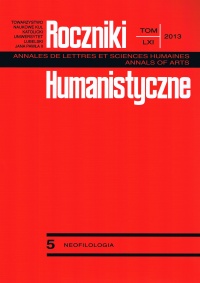Le roman d’aventures et l’aventure du roman : L’Équipée malaise de Jean Echenoz
Abstrakt
Powieść przygodowa i przygoda powieści: L’Équipée malaise Jeana Echenoza
Celem niniejszego artykułu jest analiza wykorzystywania reguł gatunkowych i ich transgresji we współczesnej prozie francuskiej, na przykładzie powieści czołowego jej przedstawiciela, jakim jest Jean Echenoz. L’Équipée malaise, historia niespełnionej miłości i nieudanego spisku, to przede wszystkim niekonwencjonalny tekst, który odrzuca schematy i burzy utarte czytelnicze nawyki. Nawiązując do kanonów powieści przygodowej, Echenoz nie kopiuje w naiwny sposób konwencji gatunkowych ani też nie dokonuje ewidentnej parodii. Poprzestając na sporadycznym zapożyczeniu utartych wątków i charakterystycznych scen, tworzy nietypową powieść, która jest jednocześnie negatywnym odbiciem gatunku i przekraczaniem jego granic. Zestawienie stereotypowej opowieści z nomadyczną narracją opartą na dygresyjności, powtórzeniach i licznych zwrotach akcji przekształca powieść przygodową w „przygodę pisania”, oferując czytelnikowi intelektualną wycieczkę w świat fikcji, której zasady zostały podważone.
Le roman d’aventures et l’aventure du roman : L’Équipée malaise de Jean Echenoz
Le présent article se pose pour but d’analyser la transgression des rčgles génériques dans le roman L’Équipée malaise de Jean Echenoz. Histoire d’un amour déçu et d’un projet échoué, L’Équipée malaise c’est surtout un texte déconcertant qui réfute les schémas conventionnels et les habitudes de lecture. Sans imiter de maničre naďve les principes du genre évoqué, Echenoz ne procčde non plus ŕ une parodie évidente. En empruntant au roman d’aventures quelques trames d’ensemble ou des scčnes conventionnelles, il construit un roman tout ŕ fait original qui est ŕ la fois un reflet négatif du genre évoqué et sa transgression męme. La confrontation entre un récit fictionnel stéréotypé et une narration déréglée transforme un roman d’aventures en une aventure du roman, offrant au lecteur tout le plaisir intellectuel de lire une fiction subvertie.
Bibliografia
Barthes, R. 1972 [1953]. Le Degré zéro de l’écriture. Paris : Seuil.
Barthes, R. 1970. S/Z. Paris : Seuil.
Bessard-Banquy, O. 2003. Le roman ludique: Jean Echenoz, Jean-Philippe Toussaint, Éric Chevillard. Villeneuve d’Ascq : Presses Universitaires du Septentrion.
Blanckeman, B. 2000. Les récits indécidables. Jean Echenoz, Hervé Guibert, Pascal Quignard. Villeneuve d’Ascq : Presses Universitaires du Septentrion.
Blanckeman, B. 2002. Les fictions singulières. Étude sur le roman français contemporain. Paris : Prétexte Éditeur.
Bourneuf, R., Ouellet, R. 1989 [1972]. L’univers du roman. Paris : PUF.
Echenoz, J. 1986. L’Équipée malaise. Paris : Les Éditions de Minuit.
Eco, U. 1979 [1965]. L’œuvre ouverte. Paris : Seuil.
Gautier, T. 1856. Voyage en Espagne. Paris : Charpentier.
Houppermans, S. 2008. Jean Echenoz : étude et l’œuvre. Paris : Éditions Bordas.
Lepape, P. 1987. « La subversion du roman ». Le Monde, 9 janvier 1987. http://www.lemonde.fr/cgi-bin/ACHATS/ARCHIVES/archives.cgi?ID=ede773010f28eabaa3c0a44e8d534aea8eef57b70e2a053d (page consultée le 16 septembre 2013).
Mura-Brunel, A. 2008. « Filiations insolites – introduction ». In : A. Mura-Brunel (réd.) 2008. Chevillard, Echenoz. Filiations insolites, Amsterdam–New York : Rodopi. 7-13.
Ricardou, J. 1967. Problèmes du nouveau roman. Paris : Seuil.
Salmon, Ch. 2007. Storytelling, la machine à fabriquer les histories et à formater les esprits. Paris : Éditions de la Découverte.
Tadié, J.-Y. 1996. Le Roman d’aventures. Paris : PUF.
Copyright (c) 2013 Roczniki Humanistyczne

Utwór dostępny jest na licencji Creative Commons Uznanie autorstwa – Użycie niekomercyjne – Bez utworów zależnych 4.0 Międzynarodowe.





